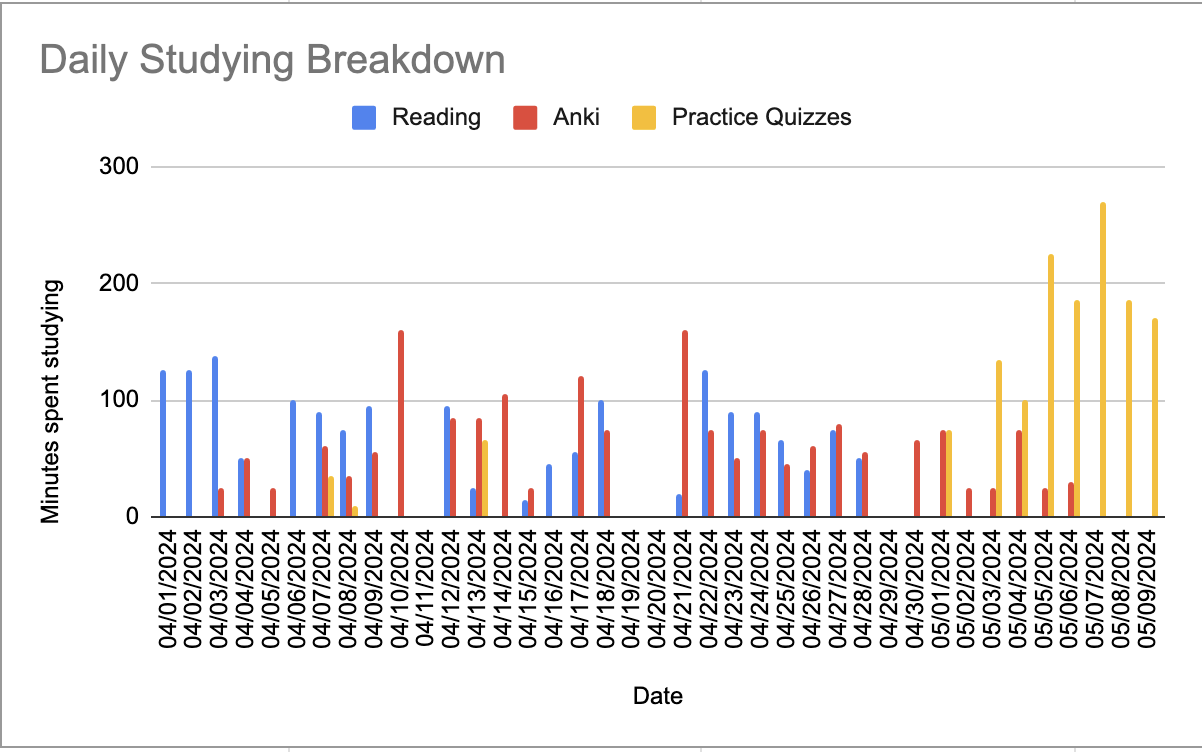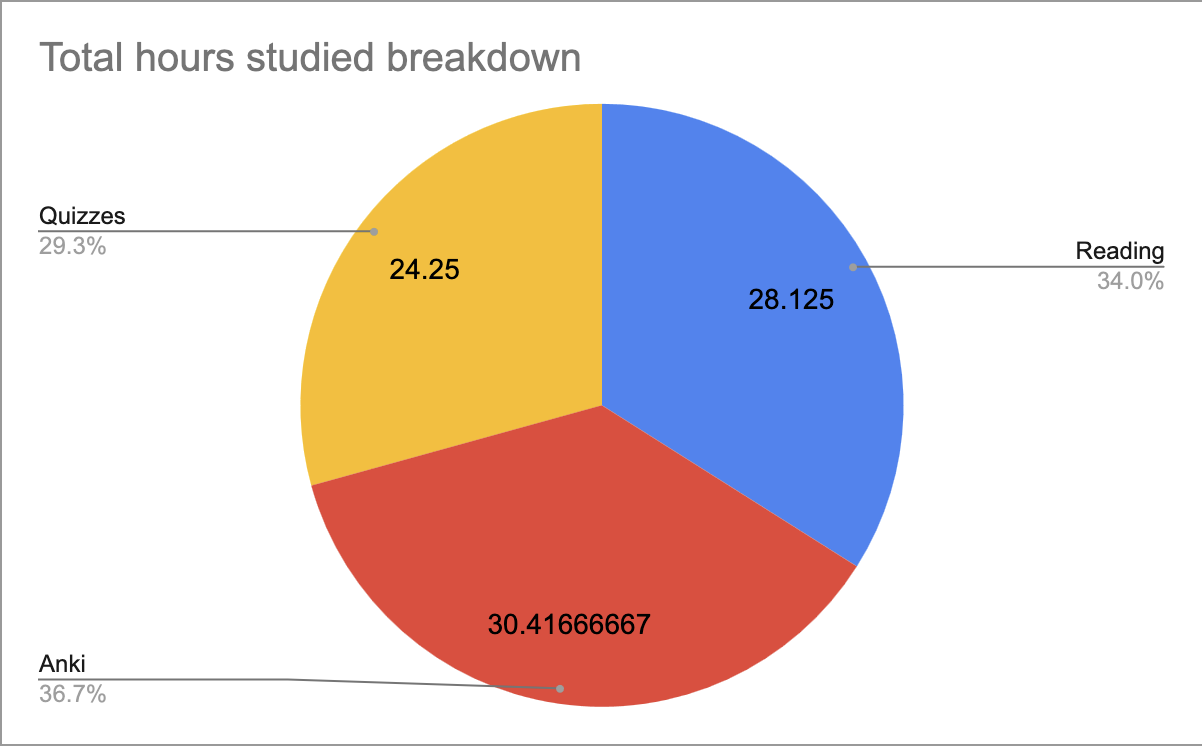Passing the Series 65 Exam
On May 10th, I passed the Series 65 Uniform Investment Adviser Law Exam. I spent ~5 weeks studying for a total of 83 hours. In this post, I’ll describe the tools and techniques I used to prepare, and provide tips for more efficient studying based on my experience.
Summary
- Studying for this exam was hard work no matter how you slice it. Be prepared to put in 80 to 90 hours of total study time if you want to walk into the exam feeling confident.
- Flashcards + spaced repetition was critical for retaining the exam material.
- I recommend scheduling the exam at most six weeks out and grinding hard. Giving yourself more time undermines the sense of urgency you need for intense and focused studying.
- I’m a software engineer by trade and my formal education is in computer science. If you have a finance background then you’ll probably need less time than me!
Tools and Techniques Used
Kaplan Financial Textbook and Practice Quizzes
I used Kaplan’s Series 65 Basic Self-Study Package for their textbook and exam bank. The CEO of the firm I work for also used this package for his studies. I have only positive things to say about this material. The textbook is well written and the exam bank is definitely worth it. The quizzes and simulated exams closely mirrored the actual exam. And just to be clear, this is not an official endorsement. I have no affiliation with Kaplan.
Pomofocus
Pomofocus is a free pomodoro studying tool. I’m a big fan of the Pomodoro technique for studying, especially for material I don’t find exciting. The short breaks in between study sessions allowed me to go longer and absorb more material than if I had studied for long hours without breaks. I used the default setting of 25-minute study sessions, 5-minute short breaks, and 15-minute long breaks, but feel free to adjust based on personal preference.
Anki
Anki is a free spaced repetition flashcard program. It is an incredible tool for retaining knowledge. If you’re new to spaced repetition, this article is an excellent primer.
Simply reading the textbook—a passive learning approach—won’t be enough to pass. I can’t stress enough how important active recall is if you want to actually retain the material.
My Anki deck ended up totaling 800 cards. I’m not going to share it publicly because you should create your own. The very act of crafting those cards is part of your learning!
Study Breakdowns
From April 1st to May 9th I studied almost daily, splitting my time between reading the textbook, flashcards, and taking practice quizzes. The daily average was 2.1 hours.
Daily Studying Breakdown

Naturally, early on most of my time was spent reading the textbook. I gradually transitioned to more flashcards and quizzes as I progressed through the book. I gave up on the flashcards (even though I had outstanding cards to review) in the last three days before the exam, and instead did just exams and practice quizzes.
Most of my practice quizzes were unit based. Kaplan’s software lets you control the number of questions and which topics you want to cover. I liked to do single unit, 20-question quizzes. Those took anywhere from 5 to 15 minutes per quiz.
I did three simulated exams in the last three days before the exam. My scores were 85%, 91%, and 88%. I would hold off on doing the simulated exams until the final week.
Studying was light from April 14th to April 21st because I was on vacation in Mexico.
Study Category Breakdown

It was more or less an even split between the three categories. If you study right, then I think you’ll end up with roughly the same distribution, perhaps with a little less time spent on flashcards and more spent on quizzes and exams.
Recommendations
Don’t Study the Book Cover to Cover
This was my biggest mistake. I studied the book cover to cover, but it would have been better to prioritize units based on how many questions appear on the exam related to that unit.
For example, Unit 14 in the book covers Ethical Practices and Obligations, and according to Kaplan the exam has roughly 11 questions on this topic. Cover the units with the most questions first and work your way down. I didn’t even read Unit 12 because it was massive and the exam only asks two questions about it. That’s not a good ROI for a 140-question exam if you’re pressed for time.
Do practice quizzes daily
If you check out the daily chart, you’ll see that there was a big gap in the middle where I wasn’t doing any practice quizzes. I should have spent more time doing practice quizzes, maybe one or two per day, even if it meant not finishing all my outstanding flashcards for that day.
Don’t be too eager adding flashcards
I think I was too eager to add flashcards to my Anki deck. The result was a huge number of cards, not all of them useful, and some days where I spent 1-2 hours on flashcard review alone! Those days were grueling. Some things I would have done differently:
- Limit flashcards to True / False and non-open ended answers.
- Limit the total number of flashcards added per day to avoid overload. 50 per day is on the high side, but a good limit. Some chapters are lighter than others, so some days you won’t add a lot, and other days you will.
Why Did I Take This Exam?
This is the section you’re probably least interested in, so I left it for the end, but it’s here in case you’re curious. The main reason was to qualify as an accredited investor this year. There are some investments I want to make, but I didn’t want to wait until I get my next tax return. The secondary reasons were to learn about the Investment Advisory business (the firm I work for is an IA registered with the SEC) and increase my general securities and finance knowledge. Plus, if I ever wanted to have my own hedge fund, this exam is a requirement 😉.
If you’re thinking about writing this exam and want to chat, or you’re making a securities offering and want to know if it’s exempt from state and/or federal registration (lol, jk), then don’t hesitate to reach out.